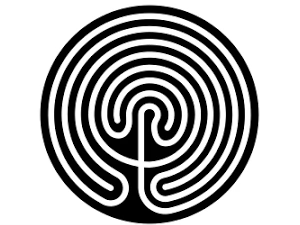Part 1: The Habit of Novelism
A continuing series tracing the long, strange trip to my forthcoming novel, The Night Garden
In late April/early May, 2016, I completed a final pass on the copyedited manuscript of my ninth novel, Moonglow, and turned it in to HarperCollins, for publication in the fall.
Barack Obama was the President of the United States. Donald Trump was tweeting about his fondness for taco bowls. Prince Rogers Nelson was still alive. And no one—perhaps not a single human on the face of the earth—had heard of Large Language Models, because Google’s “Attention Is All You Need” paper was still a year away.
Out of habit, I started pondering the question of what book, or at least what kind of book, I was going to write next.
Mann tracht un gott lacht1, as the grandmothers and great-aunts of my boyhood used with bitter familiarity to remind whole rooms of people, who never seemed to learn.
I had a few thoughts. I had some notions. If you had asked me, at the time, I would probably have said that I even had a full-fledged idea or two. I always do; some of them have been hanging around for years.2
My pondering was largely habitual because, at that moment, I didn’t particularly want—didn’t feel I needed, just yet—to write another novel.
The composition of Moonglow had gone too smoothly, too quickly—just about eighteen months from start to finish. I had never reached that enchanted zone of frustration, satiety, tedium, and disgust where ideas for all the better, cooler, more interesting, or at least less stupid books appear in shimmering troops like fairies to allure and waylay and mislead me. At the end of five, six, even seven years spent working on the same damn book, the number of potential next novels I had accumulated was always perfectly matched by the fervor of my desire to be writing something else, anything else, anything but the book I had stuck with, and been stuck with, and been stuck inside, for so long.
In the spring of 2016, I was not sufficiently unhappy, miserable, or bored, in other words, to need to start another novel. And my supply of tempting candidates was correspondingly low.
There was, first of all, the novel I had been embarked on when, not quite out of nowhere, but almost, Moonglow had first appeared: at breakfast, like a brioche dough proofed overnight in my unconscious, on the morning after the night I finished reading Denis Johnson’s Train Dreams. That one had been provisionally entitled The Grand Master, and it started, for most of its brief, abortive tenure in my imagination, like this:
Like a mothership the Grand Master descended on Texas. Silvery sleeves of her sweater-jacket a flowing pair of solar sails. Bundled silver dreadlocks the superstructure: conduits and cables for folding spacetime, recovering the histories of dead planets.
Continued in Part 2
When you make a plan, God laughs.
I still find myself thinking, from time to time, about the one I loaned to Grady Tripp, way back in, like, 1994, “the story of the two doomed baseball teams, blue and gray, playing nine on the eve of Chancellorsville.”




“Man proposes and God disposes.” — Sancho Panza.
Moonglow was my first Chabon novel and one I remember with great fondness. It’s interesting to hear about the multi-year cycles of producing novels.
Chancellorsville! So close to my grandfather’s hometown. He was the first with my name. You’ve inspired my next post with your end note.